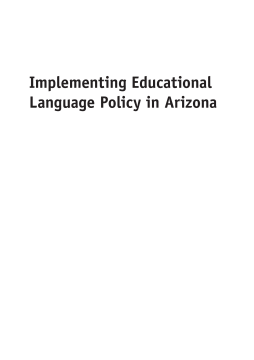
BOOK
Implementing Educational Language Policy in Arizona
Prof. M. Beatriz Arias | Prof. Christian Faltis
(2012)
Additional Information
Book Details
Abstract
This volume is a unique contribution to the study of language policy and education for English Learners because it focuses on the decade long implementation of “English Only” in Arizona. How this policy influences teacher preparation and classroom practice is the central topic of this volume. Scholars and researchers present their latest findings and concerns regarding the impact that a restrictive language policy has on critical areas for English Learners and diverse students. If a student's language is sanctioned, do they feel welcome in the classroom? If teachers are only taught about subtractive language policy, will they be able to be tolerant of linguistic diversity in their classrooms? The implications of the chapters suggest that Arizona's version of Structured English Immersion may actually limit English Learners' access to English.
Evidence of the harmful effects of Arizona's instructional policy for English learners has mounted. This one volume, edited by Arias and Faltis, two of the nation's leading experts in the field, provides solid evidence carefully linked to theory, and compelling arguments for why the policy is blatantly discriminatory. It also provides important guidance for policymakers and the courts as they evaluate the legal basis for Arizona's misbegotten language instructional policy. Read it and be empowered to act!
Patricia Gandara
In this timely and illuminating volume edited by Beatriz Arias and Christian Faltis, the authors concisely deconstruct the folk theory that English is, by its very existence, the sole language of instruction. The brilliance of this edited volume Implementing Educational Language Policy in Arizona, lies in the authors' rigorous deconstruction of unproven methods to teach linguistic minority students solely in English even when they are not yet proficient in the language thereby depriving them of their linguistic and cultural dignity and the opportunity to become literate in their own language. Using various data sources from empirical research in second language acquisition to historical analyses of the pervasive mis-education of Latino(a) students, the authors authoritatively provide a censorship portrayal of Arizona – a state that not only banned instruction in languages other than English, but is, increasingly, becoming ever more totalitarian in its censorship in public schools of books such as Paulo Freire's world-renowned classic, Pedagogy of the Oppressed, among other authors who advocate education for liberation. Implementing Educational Language Policy in Arizona goes beyond detailing the crisis of education in Arizona. It powerfully and painfully lays bare Arizona's current shameful crisis of democracy.
Lilia Bartolome, University of Massachusetts, USA
Indeed what is most impressive about the book is the way in which it passionately advocates by appealing to sound research and professional knowledge that falls squarely within the purview of the authors’ expertise. Despite any minor faults, the volume is a welcome addition to the literature in the field of equity and English learner education.
Keira Ballantyne, George Washington University, USA
M. Beatriz Arias is an Associate Professor of English Education in the College of Liberal Arts and Sciences at Arizona State University. She has edited several books and published scholarly articles on Latino students and educational policy, and has focused her research on equity issues for English Learners and Latino students and teachers. She has served as a Court Appointed Monitor for a Federal Court Judge in San Jose California; and in Chicago, Denver and Los Angeles school desegregation cases, she has participated as a Court Appointed expert.
Christian Faltis is the Dolly and David Fiddyment Chair in Teacher Education and Professor of Language, Literacy and Culture in the School of Education at University of California, Davis. He has authored numerous books and scholarly writing on bilingual education and Latino students. His most recent book is Education, immigrant students, refugee students, and English learners (2010, with Guadalupe Valdés). He is Editor of Teacher Education Quarterly, and Editor of Review of Research in Education, Vol. 37.
This thorough and passionate book offers a critical analysis of Proposition 203, Arizona's law seeking to eliminate bilingual education, and documents the grave impact it has had. Policymakers and voters as well as anyone concerned about the education of bilingual students should be required to read this book to understand the negative effects of restrictive language policies, and specifically the mandatory “Structured English Immersion” model now being widely implemented. This book is a call to action for the promotion of expansive language education policies, which build on the home languages of all students.
Kate Menken, Queens College & Graduate Center, City University of New York, USA
Table of Contents
| Section Title | Page | Action | Price |
|---|---|---|---|
| Contents | v | ||
| Contributors | vii | ||
| Foreword: From Restrictive SEI to Imagining Better | xiii | ||
| Introduction | xxiii | ||
| Part 1 Language Policy in Arizona | 1 | ||
| 1 Language Policy and Teacher Preparation: The Implications of a Restrictive Language Policy on Teacher Preparation | 2 | ||
| 2 Research-based Reform in Arizona: Whose Evidence Counts for Applying the Castañeda Test to Structured English Immersion Models? | 20 | ||
| 3 SLA Research and Arizona’s Structured English Immersion Policies | 38 | ||
| Part 2 Implementing SEI in Arizona | 57 | ||
| 4 Everything on Its Head: How Arizona’s Structured English mmersion Policy Re-invents Theory and Practice | 58 | ||
| 5 Teachers’ Sheltered English Immersion Views and Practices | 85 | ||
| 6 Review of ‘Research Summary and Bibliography for Structured English Immersion Programs’ of the Arizona English Language Learners Task Force | 106 | ||
| Part 3 Arizona Teacher Preparation for SEI | 118 | ||
| 7 ‘They’re Just Confused’: SEI as Policy into Practice | 119 | ||
| 8 Implementing Structured English Immersion in Teacher Preparation in Arizona | 140 | ||
| 9 The Politics of Preservice Teachers | 162 |
